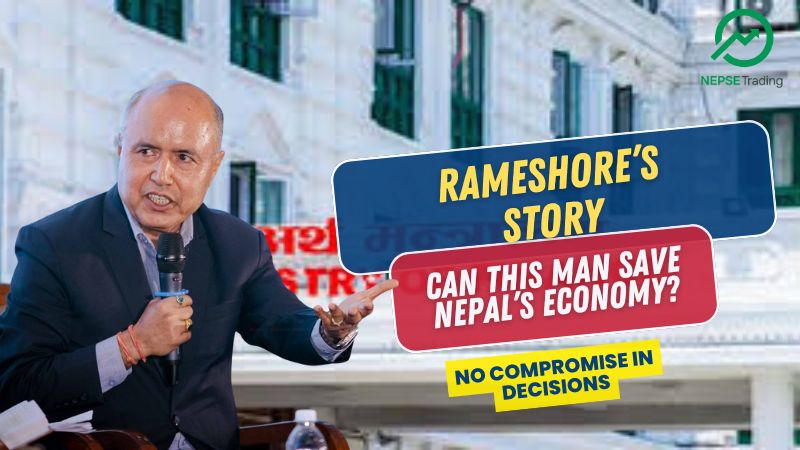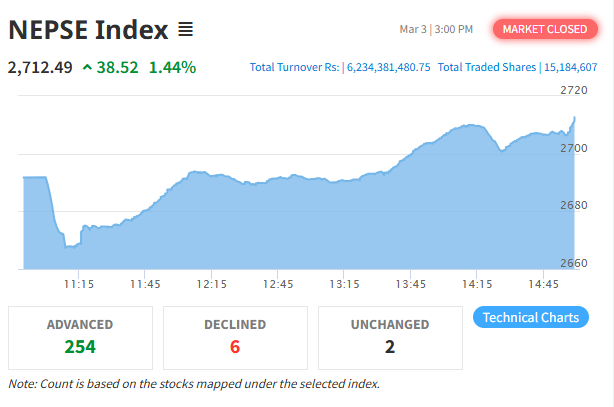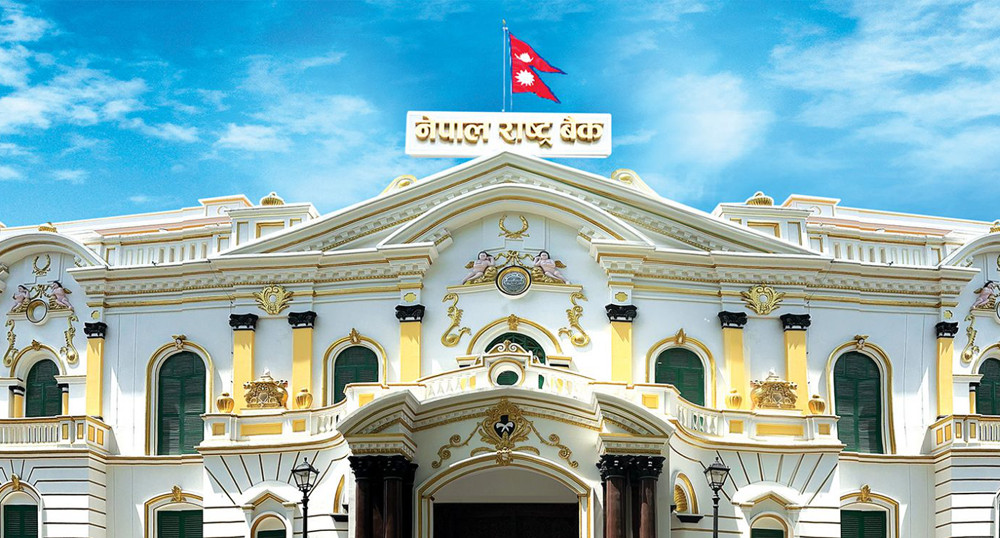अर्थसचिवदेखि अर्थमन्त्रीसम्म : रामेश्वर खनालको दृढ यात्राको कथा
Author
NEPSE TRADING

प्रधानमन्त्री सुशीला कार्कीले संवेदनशील घडीमा मन्त्रिपरिषदलाई पूर्णता दिँदै पूर्वअर्थ सचिव रामेश्वर खनाललाई अर्थमन्त्री नियुक्त गरेकी छन्। देश आर्थिक संकटको गहिरो खाडलमा छ, यस्तो अवस्थामा खनालको अनुभव र दृढताले अर्थतन्त्रलाई नयाँ बाटो देखाउन सक्ने विश्वास गरिएको छ।
०१३ साल असार २ गते पाल्पा, तानसेनमा जन्मिएका खनाल बाल्यकालदेखि नै असाधारण विद्यार्थी थिए। १७ दिन बाँकी रहँदा तीन कक्षामा एकैपटक भर्ना भएर प्रथम हुने, विद्यालयदेखि विश्वविद्यालयसम्म निरन्तर अग्रस्थानमा रहने, वैदिक संस्कारअनुसार पूजा–जपमा अनुशासित हुने उनको पहिचान थियो। पढाइसँगै घरायसी काममा समेत सक्रिय हुने बानीले उनलाई अनुशासन र श्रमको संस्कार दियो।
२०३७ सालमा २३ वर्षको उमेरमा उनले लोक सेवा आयोगमार्फत सहकारी अधिकृतको रूपमा सरकारी सेवा सुरु गरे। नेपालगञ्जमा साझा विकास कार्यालय प्रमुख हुँदा उनले सीमावर्ती वार्तामा प्रमुख जिल्ला अधिकारीसँगै सहभागिता गरे। बजेट अभाव हुँदा साइकलमै अनुगमनमा निस्कने र अनियमितता गर्ने व्यापारीलाई सदरमुकाम ल्याउने उनको शैली चर्चित रह्यो।
करिब १६ वर्ष सहकारी क्षेत्रमा बिताएपछि उनी महालेखा नियन्त्रक कार्यालय हुँदै ०५९ सालमा अर्थ मन्त्रालय पुगे। त्यही बाटो हुँदै उनी अर्थसचिव बने र अन्ततः आज अर्थमन्त्रीको कुर्सीमा पुगेका छन्।
खनाल अर्थसचिव हुँदा धेरै घटनाले उनलाई चर्चित बनाए। विद्युत प्राधिकरणमा ८ सय करार कर्मचारीलाई स्थायी गर्न गरिएको दबाबलाई उनले अस्वीकार गरे। मन्त्रीदेखि कार्यकारी निर्देशकसम्म उनको कक्षमा पटक–पटक पुगे तर उनले भने, “प्राधिकरण बन्द भए पनि स्थायी स्वीकृति दिन्न।”
त्यसैगरी, एक पटक शेयर लगानीकर्ताले कारोबार ठप्प पारे। दबाब दिन उनीहरू अर्थ मन्त्रालय पुगे। तर खनाल अडानमा अडिग रहे—“कारोबार नखोली वार्ता गर्दिनँ।” अन्ततः एक हप्तापछि बजार खुल्यो र लगानीकर्ताले वार्तामा आउन बाध्य भए।
नेपाल राष्ट्र बैंकमा आन्दोलनरत कामदारलाई समेत उनले चेतावनी दिए—“धर्ना हटेपछि मात्र छलफल हुन्छ।” दुई महिनासम्म धर्ना चले पनि अन्ततः कामदार आफैं आन्दोलन अन्त्य गर्न बाध्य भए। यी घटनाले खनाललाई लोकप्रिय भन्दा पनि विवेकशील र कठोर निर्णयकर्ता बनायो।
उनको इमानदारी पनि प्रशंसनीय रह्यो। पदमा रहेर व्यक्तिगत फाइदा लिन उनले कहिल्यै खोजेनन्। मातहत कर्मचारीलाई खुलेर चेतावनी दिन्थे—“मेरो नाममा पैसा असुल्ने हो भने सहन्न।” राजनीतिक पहुँच प्रयोग गरेर सरुवा वा बढुवा माग्ने संस्कृतिलाई उनले सधैं अस्वीकार गरे। यसले उनलाई स्वच्छ छविको प्रशासक बनायो।
खनाल अध्ययनशील व्यक्तित्व पनि हुन्। सार्वजनिक कार्यक्रममा उनले अरु भन्दा छिट्टै समस्या बुझ्ने, पालो नआउँदासम्म मोबाइल वा आइप्याडमार्फत अनुसन्धान गर्ने बानी बसाल्थे। उनलाई प्रायः “ज्ञान दिने पात्र”को रूपमा चिनिन्थ्यो, जसले गर्दा उनी सबैभन्दा बढी विषयगत ज्ञान भएका सचिव बने।
राजनीतिक जीवनमा उनले नेपाली कांग्रेसमार्फत प्रवेश गरे पनि दलगत स्वार्थसँग सम्झौता नगर्ने सिद्धान्तमा अडिग रहे। विपक्षी दलका उदारवादी नेताको समेत खुलेर प्रशंसा गर्ने उनको स्वभावले उनी “दलको सदस्य भए पनि स्वतन्त्र विवेकमा अडिग सचिव” बने।
यद्यपि, चाकडी नगर्ने प्रवृत्तिका कारण उनलाई सचिव बन्न ढिलो भयो। उनीभन्दा पछि सेवा प्रवेश गरेका साथीहरु सचिव भएर अवकाश पाए, तर उनी ढिलो मात्र सचिव बने। ढिलाइले उनलाई कमजोर बनाएन, बरु अझ दृढ र प्रभावशाली बनायो।
आज उनी अर्थमन्त्री बनेका छन्। तर चुनौतीहरु ठूला छन्। बेरोजगारी बढ्दो छ, लगानी पलायन तीव्र छ, उत्पादनमूलक क्षेत्र कमजोर छ, कर संरचना जटिल छ। तर उनको विगतले आशा पनि जगाएको छ—सुधार सम्भव छ। लगानी सहजता, कर प्रणाली सुधार, उद्यमशीलतालाई प्रोत्साहन र रोजगारी सिर्जनातर्फ उनी लाग्ने अपेक्षा गरिएको छ।
रामेश्वर खनालको कथा केवल व्यक्तिगत जीवनयात्रा होइन, नेपालकै प्रशासनिक संस्कृतिको दर्पण हो। उनका कठोर अडानहरूले देखाएका छन्—प्रणालीगत सुधार सम्भव छ। उनको इमानदारीले सन्देश दिएको छ—सार्वजनिक पद निजी फाइदाको साधन होइन। अध्ययनशीलताले प्रमाणित गरेको छ—ज्ञान र विवेककै आधारमा निर्णय गर्न सकिन्छ।
अब सबैको नजर एकै प्रश्नमा टक्क अडिएको छ—अर्थमन्त्रीको रूपमा खनालले आफ्नो विगतकै दृढता, इमानदारी र विवेक कायम राख्छन् कि राख्दैनन्? यदि राखे भने, यो मुलुक आर्थिक पुनरुत्थानको नयाँ अध्यायतर्फ अघि बढ्नेछ।




